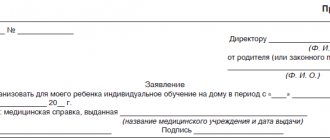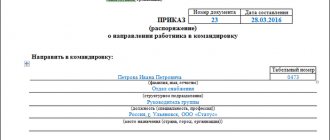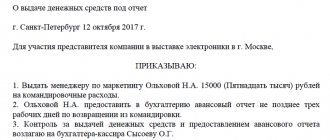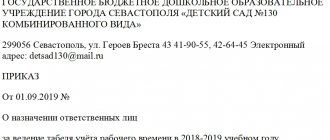Court order. Definition of the concept, the essence of writ proceedings
Court order under the Code of Civil Procedure of the Russian Federation
A court order is a court decision made by a single judge on the basis of an application for the collection of sums of money or for the recovery of movable property from the debtor according to the requirements provided for in Article 122 of this Code, if the amount of money to be recovered or the value of the movable property subject to recovery does not exceed five hundred thousand rubles (Article 121 of the Code of Civil Procedure of the Russian Federation).
Thus, the list of requirements for which a court order can be issued is exhaustive and is given in Article 122 of the Code of Civil Procedure of the Russian Federation.
Proceedings for the issuance of a court order are an independent type of civil proceedings. The essence of writ proceedings is that the judge alone considers the claimant’s application for one of those listed in Art. 122 of the Code of Civil Procedure of the Russian Federation requires the issuance without trial of a court order, called a court order, for the forced recovery of money or movable property from the debtor.
Persons participating in writ proceedings are called “claimant” and “debtor”, and not “plaintiff” and “defendant”, as in claim proceedings.
Court order according to the Arbitration Procedure Code of the Russian Federation
A court order is a judicial act issued by a single judge on the basis of an application for the collection of sums of money according to the claims of the claimant, provided for in Article 229.2 of the Arbitration Procedure Code of the Russian Federation (Article 229.1 of the Arbitration Procedure Code of the Russian Federation). That is, just like the Code of Civil Procedure of the Russian Federation, the Arbitration Procedure Code of the Russian Federation contains an exhaustive list of requirements for which a court order can be issued.
The rules on the form and content of an application for the issuance of a court order are contained in Article 229.3 of the Arbitration Procedure Code of the Russian Federation.
Court order under the CAS RF
A court order is a judicial act issued by a single judge on the basis of an application at the request of a claimant for the collection of mandatory payments and sanctions (Article 123.1 of the CAS RF).
An application for a court order and the documents attached to such an application are submitted to the magistrate. The rules on the form and content of an application for a court order are contained in Article 123.3 of the CAS RF.
What's new in legislation as of October 1, 2019?
Issuance of a court order under the Civil Procedure Code, the Arbitration Procedure Code of the Russian Federation from 10/01/2019 (the list of requirements for which a court order is issued has changed. From 10/01/2019, the maximum value of the requirements under the Arbitration Procedure Code of the Russian Federation that can be considered in the order of writ proceedings should not exceed 500,000 rubles).
What information about the defendant should be included in the statement of claim (and about the debtor in the application for a court order)? From October 1, 2019, you will have to provide more information about the defendant (debtor).
Sample applications for issuance of a court order
- Application for the issuance of a court order based on a notarized transaction
- Application for the issuance of a court order on a claim based on a transaction concluded in simple written form
- Application for the issuance of a court order on a demand based on a protest of a bill of non-payment made by a notary
- Application for a court order to collect child support
- Application for the issuance of a court order on a claim for the recovery of accrued but unpaid wages or vacation pay, dismissal payments, and other amounts
- Application for the issuance of a court order for the recovery of monetary compensation for violation of the deadline for payment of wages, vacation pay, and payments upon dismissal
- Application for issuance of a court order to collect debt for payment of housing and communal services (housing and communal services)
- Application for the issuance of a court order for the collection of obligatory payments and contributions from a member of the HOA (or building cooperative)
What is a court order
When going to court, citizens make demands for the restoration or protection of a violated right. As a rule, this is accompanied by the presence of a civil or arbitration dispute between the plaintiff and the defendant, for the consideration of which it is necessary to carefully study written and material evidence, as well as hear the arguments of the parties.
In relation to some categories of legal relations, the legislator does not provide for the existence of disputes that would be subject to consideration during litigation. For such cases, writ proceedings are provided, which takes into account the following circumstances:
- there is no need to submit a statement of claim to issue an order;
- the order is issued not based on the results of consideration of the evidence, but automatically due to the presentation of certain requirements;
- consideration of applications for the issuance of an order can only occur in the category of “indisputable” cases in which there is no dispute between the parties.
Such rules make it possible to consider citizens’ claims in the shortest possible time and according to a simplified procedure, because the court does not need to schedule a hearing and summon the parties. The order will be issued on the basis of the application received, and the court will only have to find out whether it complies with the law.
Court orders can be issued in the following categories of cases:
- on the collection of arrears of wages, reliably confirmed by documents from the place of work;
- on establishing alimony obligations based on legal requirements;
- on the collection of undisputed debts on taxes and fees;
- on the collection of other undisputed payments (for example, for utilities).
Classifying certain categories of disputes as indisputable cases does not mean that citizens cannot have claims on the merits of the requirements. For example, collecting a debt for housing and communal services by issuing a court order may be obviously unlawful if the debtor has long ago paid the entire debt, and the applicant has not taken it into account in his personal account.
In such cases, it is possible to challenge the court order and cancel it.
Pros and cons of writ proceedings
The advantage of writ proceedings is the shortened period for consideration of the claimant’s application (Article 126 of the Code of Civil Procedure of the Russian Federation). In addition, the application is considered without summoning the parties, and the state fee for consideration of the application is paid in a smaller amount than when filing a claim in court.
The disadvantage of writ proceedings is the cancellation of the court order by the magistrate who issued it in the event of the receipt of unmotivated objections from the debtor regarding the execution of this court order within ten days from the moment it was received by the debtor (the debtor is not required to justify his objections) (Article 129 of the Code of Civil Procedure of the Russian Federation). In addition, the possibility of appealing court orders of the Code of Civil Procedure of the Russian Federation is not provided for (for more details, see below).
The problem is that if for some reason the debtor has not received a copy of the court order, the ten-day period for filing objections to it does not even begin to run and, subsequently, having received a copy of the court order, the debtor will be able to file his objections regarding its execution.
So, for example, the Constitutional Court of the Russian Federation indicated: “...by virtue of Articles 127, 128 of the Code of Civil Procedure of the Russian Federation, a court order is sent once and to the address indicated by the claimant. However, due to the fact that the period during which the debtor has the right to file objections to the court order begins to run from the moment the debtor receives the court order (Article 128 of the Code of Civil Procedure of the Russian Federation), and the debtor can change his location, the contested norms do not exclude the possibility of re-submitting the court order to the debtor at his new location in order to prevent the writ proceedings from being delayed indefinitely” (decision of the Constitutional Court of the Russian Federation of November 20, 2008 N 1035-О-О)
If the application deadline is missed
Situations where the defendant misses the deadline for filing an objection are common. The reason may be the fact that the debtor did not receive the order in a timely manner. Such cases are provided for in Article 128 of the Civil Procedure Code. In accordance with the norm enshrined in this article, a citizen has the right to file an objection within 10 days from the moment he learned about the order.
If the missed deadline is due to another reason, then it will be possible to take advantage of the opportunity to file an objection only through a cassation appeal. This can be done within six months after the order is issued. The application must indicate the reason for missing the standard deadline.
If the reason is recognized by the court as valid, the objection will be upheld. But the magistrate's order will not be suspended. In this situation, all funds and property that were collected from the debtor will be returned to him.
Cancellation of the court order. Sample application to cancel an order
The magistrate is obliged to cancel the court order issued by him, regardless of the reasons and arguments that the debtor gives in his objections to the execution of the court order. The debtor has the right not to provide reasons for his objections to the execution of the court order at all.
If the debtor’s objections are received within the established period, the judge is obliged to issue a ruling to cancel the court order and explain to the recoverer his right to bring a claim on a general basis.
Sample: Objections to a court order
Why file an objection?
Each person has his own rights and obligations, and if they are violated, he has the right to object if he believes that they have been violated. The same applies to the decision on collection. When the debtor does not agree with the court's decision, he can file a protest, and the reason for this reason does not have to be indicated. Although it is recommended to justify everything, since this gives a greater guarantee that the objection to execution will be accepted.
In addition, filing such a protest gives the applicant expanded procedural rights , namely:
- further consideration of the case will be carried out with the participation of the debtor,
- the opportunity to provide evidence in your defense,
- You can subsequently file an appeal in the form of a statement of claim.
It follows from this that it is simply necessary to write an objection regarding the execution of a court order if, in the opinion of the applicant, his rights were violated or the filing of an application with the court was not justified and all the circumstances of the process under consideration were not taken into account.
If rights are violated, then it is simply necessary to write a statement regarding the execution of the court order
Features of writ proceedings
The letter of Rospotrebnadzor dated 09/04/2007 N 0100/8970-07-32 “On the law enforcement practice of issuing court orders” names some features, in particular, the following explanations are provided.
Deadline for issuing a court order. No trial
A distinctive feature of writ proceedings are the provisions of Art. 126 of the Code of Civil Procedure of the Russian Federation, according to which a court order is issued on the merits of the stated claim within five days from the date of receipt of the application for a court order to the court without trial and summoning the parties to hear their explanations.
In the absence of a dispute about the right...
Writ proceedings are applied only in the absence of a dispute about the right (clause 4, part 1, article 125 of the Code of Civil Procedure of the Russian Federation).
10 days to object. Date of receipt of the court order
The judge sends a copy of the court order to the debtor, who, within ten days from the date of receipt of the order, has the right to submit objections regarding its execution (Article 128 of the Code of Civil Procedure of the Russian Federation). In this case, upon receipt of the order, the date of receipt of the court order is considered to be the date the debtor signed the receipt of the specified document, regardless of the method of receipt (directly in court or through the postal operator).
Missing the deadline for filing objections to a court order
If, for good reasons, the debtor missed the deadline for filing objections regarding the execution of the court order and its cancellation, such deadline may be restored by the court at the request of an interested person on the basis of Art. 112 Code of Civil Procedure of the Russian Federation.
Cancellation of a court order in case of objections to the court
Within the meaning of Article 129 of the Code of Civil Procedure of the Russian Federation, the debtor is not obliged to substantiate his objections, because the basis for canceling a court order is the direct fact of the debtor’s statement to the court of disagreement with the execution of the said judicial act.
Issuance of a court order to the claimant
According to the provisions of Part 1 of Art. 130 of the Code of Civil Procedure of the Russian Federation, if the debtor does not submit objections to the court within the prescribed period, the judge issues to the creditor a second copy of the court order, certified by the official seal of the court, to present it for execution. At the request of the claimant, a court order, in accordance with the provisions of Part 3 of Art. 127 of the Code of Civil Procedure of the Russian Federation, drawn up on a special form, can be sent by the court for execution directly to the bailiff.
For more details, see letter of Rospotrebnadzor dated 09/04/2007 N 0100/8970-07-32 “On the law enforcement practice of issuing court orders”
○ What to do after submission, cancellation deadlines.
After the judge receives the objection, he considers it individually and makes a decision to cancel the court order or refuse to satisfy the debtor's salary.
The judge cancels the court order if the debtor raises objections regarding its execution within the prescribed period. In the ruling on the cancellation of the court order, the judge explains to the claimant that the stated claim can be presented by him in the manner of claim proceedings. Copies of the court ruling to cancel the court order are sent to the parties no later than three days after the day it was issued (Article 129 of the Code of Civil Procedure).
If the issue cannot be resolved in the magistrate’s court, you can file a cassation appeal with a higher court and await consideration of your petition. At the same time, you should send the magistrate an application to suspend enforcement proceedings until the results of your complaint are received.
State duty when filing an application for a court order
The state fee when filing an application for a court order is determined in accordance with Part 2 of Art. 123 Code of Civil Procedure of the Russian Federation and paragraphs. 2 p. 1 art. 333.19 of the Tax Code of the Russian Federation, according to which, when filing an application for a court order, the state fee is paid in the amount of 50 percent of the state fee established for filing a claim of a property nature subject to assessment.
For example, the applicant asks the court to issue a court order to collect the amount of borrowed funds and interest for the use of borrowed funds under a loan agreement made in simple written form in the amount of 100,000 rubles. The amount of the state duty for considering an application for a court order will be 1,600 rubles, and not 3,200 rubles, which should have been paid for considering a statement of claim for the recovery of this amount (we recommend: a calculator for calculating the state duty to the court).
When the state fee for consideration of an application for a court order is not paid
Collection of wages and other requirements from labor relations
State duty is not paid according to paragraphs. 1 clause 1 art. 333.36 of the Tax Code of the Russian Federation as plaintiffs in claims for the recovery of wages (monetary support) and other claims arising from labor relations, as well as in claims for the recovery of benefits.
Collection of alimony
From paying state duty in accordance with paragraphs. 2 p. 1 art. 333.36 of the Tax Code of the Russian Federation exempts plaintiffs in claims for alimony.
If the applicant (plaintiff) is exempt from paying state duty, it will be paid by the debtor (defendant)
In accordance with paragraphs. 8 clause 1 art. 333.20 of the Tax Code of the Russian Federation, if the plaintiff is exempt from paying the state duty in accordance with the Tax Code of the Russian Federation, the state duty is paid by the defendant (if he is not exempt from paying the state duty) in proportion to the amount of the claims satisfied by the court.
When is the order issued?
Any debtor with unpaid bills can receive a court order by mail or hand.
It notes that he is obliged to repay the debt in favor of the plaintiff within the established time frame. But sometimes you have to deal with the fact that the court order is not delivered to the addressee. In this case, funds may be written off without notification. And the natural question is how to cancel the document.
A court order is issued in several cases provided for in the Code of Civil Procedure of the Russian Federation:
- for transactions executed in the form of a simple written agreement;
- under notarial agreements;
- if there are obligations to repay debt for utility bills, telephone communications;
- when claiming alimony payments;
- in case of delays and non-payment of wages;
- in case of debt on loans;
- in the absence of payment of taxes.









